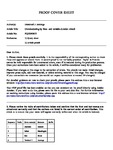Overshadowing by fixed- and variable-duration stimuli
| dc.contributor.author | Bonardi, C | |
| dc.contributor.author | Mondragón, E | |
| dc.contributor.author | Brilot, B | |
| dc.contributor.author | Jennings, DJ | |
| dc.date.accessioned | 2018-02-16T17:25:30Z | |
| dc.date.available | 2018-02-16T17:25:30Z | |
| dc.date.issued | 2015-03 | |
| dc.identifier.issn | 1747-0218 | |
| dc.identifier.issn | 1747-0226 | |
| dc.identifier.uri | http://hdl.handle.net/10026.1/10807 | |
| dc.description.abstract |
<jats:p> Two experiments investigated the effect of the temporal distribution form of a stimulus on its ability to produce an overshadowing effect. The overshadowing stimuli were either of the same duration on every trial, or of a variable duration drawn from an exponential distribution with the same mean duration as that of the fixed stimulus. Both experiments provided evidence that a variable-duration stimulus was less effective than a fixed-duration cue at overshadowing conditioning to a target conditioned stimulus (CS); moreover, this effect was independent of whether the overshadowed CS was fixed or variable. The findings presented here are consistent with the idea that the strength of the association between CS and unconditioned stimulus (US) is, in part, determined by the temporal distribution form of the CS. These results are discussed in terms of time-accumulation and trial-based theories of conditioning and timing. </jats:p> | |
| dc.format.extent | 523-542 | |
| dc.format.medium | Print-Electronic | |
| dc.language | en | |
| dc.language.iso | eng | |
| dc.publisher | SAGE Publications | |
| dc.subject | Timing | |
| dc.subject | Stimulus distribution form | |
| dc.subject | Associative learning | |
| dc.subject | Rats | |
| dc.subject | Overshadowing | |
| dc.title | Overshadowing by fixed- and variable-duration stimuli | |
| dc.type | journal-article | |
| dc.type | Article | |
| plymouth.author-url | https://www.ncbi.nlm.nih.gov/pubmed/25203812 | |
| plymouth.issue | 3 | |
| plymouth.volume | 68 | |
| plymouth.publication-status | Published | |
| plymouth.journal | Quarterly Journal of Experimental Psychology | |
| dc.identifier.doi | 10.1080/17470218.2014.960875 | |
| plymouth.organisational-group | /Plymouth | |
| plymouth.organisational-group | /Plymouth/Faculty of Science and Engineering | |
| plymouth.organisational-group | /Plymouth/REF 2021 Researchers by UoA | |
| plymouth.organisational-group | /Plymouth/REF 2021 Researchers by UoA/UoA04 Psychology, Psychiatry and Neuroscience | |
| dc.publisher.place | England | |
| dc.identifier.eissn | 1747-0226 | |
| dc.rights.embargoperiod | Not known | |
| rioxxterms.versionofrecord | 10.1080/17470218.2014.960875 | |
| rioxxterms.licenseref.uri | http://www.rioxx.net/licenses/all-rights-reserved | |
| rioxxterms.type | Journal Article/Review |


